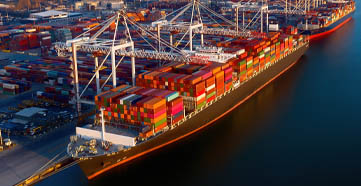|
|
Jun 13, 2022
The war in Ukraine has heightened security concerns in Europe and prompted Finland and Sweden’s request to join NATO. The unprecedented move has been heralded as an historic policy shift to deter Russian aggression in the region.
Do design, bid, build (DBB) type contracts still deliver the results promised?
IBA Annual Conference Mexico City 2024
Aug 02, 2021
It is an undeniable truth that connectivity is becoming an everyday essential asset to humankind. In such a way, the deployment of 5G services has been chosen by governments and international entities as one of their main objectives, understanding that a swift improvement to their networks would make a huge difference in the tech race, along with allowing the community the benefits of countless new digital tools, products, and services. This article briefly shows how the 5G public bidding process was came about and developed in Chile and describes some of its key characteristics.
The session should focus on the most effective tools to detect and prosecute cartel conduct including an effective leniency regime and the interplay between criminal and civil sanctions and effective enforcement.
Speakers will share experiences, risks and practical guidance on how to detect and manage cartel cases from different perspectives.
Competition Law in Africa Conference: regulatory developments and enforcement trends across the continent
Jul 06, 2021
The Punjab Haryana and Delhi Chamber of Commerce and Industry, India (PHDCCI) held an illuminating webinar on ‘Competition Law – Recent Developments and Impacts’, on 3 March 2021, covering areas of competition law in India, new trends emerging and their effect on the market. The practices with respect to competition law among micro, small and medium enterprises (MSMEs) are not currently well understood and need to be looked at more closely to improve understanding and engender a better competitive climate in the Indian market.
This conference topic explores the intricate challenges associated with managing a global network of distribution agreements, while ensuring adherence to local laws, regulations and idiosyncratic market requirements.
In particular, the panel will focus on global enterprises, especially those in the software and cloud computing sectors, that engage local partners to distribute their products. These partnerships often involve agreements drafted from standardised global templates, typically subject to foreign choice-of-law provisions, which may need to consider the unique nuances of local jurisdictions more adequately.
The core objective of this discussion is to bring together in-house legal counsel and private practice practitioners to dissect the intricacies of these collaboration agreements. The conversation will encompass a range of critical topics, including addressing antitrust concerns, mechanisms for indemnification in breach or termination and the formulation of limitation of liability provisions.
This panel seeks to equip legal professionals with the knowledge and insights necessary to adeptly navigate the dynamic intersection of global companies and localised legal compliance within distribution agreements.
IBA Annual Conference Mexico City 2024
Jul 23, 2021
Bids, tenders and pitching for work is part of life for every law firm. However, firms that don’t have a clear bids strategy and process, aligned to the firm’s growth plans can spend a lot of time and money with little return. This guide shares some top tips to help improve your bid and pitch win rate.
•Joint ventures, mergers and acquisitions, demergers
•Asset deal versus share deal
•Primary share acquisitions, drop down and step-up transactions
•Secondary share acquisitions, takeover bids, leveragedacquisitions (leveraged buyouts (LBO) and management buyouts (MBO)
Annual IBA Latin American Regional Forum Young Lawyers’ Training Programme
Thomas Jarzombek, the Federal Government Coordinator of German Aerospace Policy, announced in April 2019 that he is drafting laws to help position Germany as a major European centre for investment in space exploration and technology. Germany hopes to better compete in a market that some investment banks have predicted will be worth $1tn or more a year by the 2040s.
This session will consider:
• introduction of cases from various countries;
• activist campaigns;
• discussion between management of listed companies and activist shareholders and disclosure to the market;
• proxy fights and operation of general shareholders meeting where activist shareholders exist; and
• activist involvement in M&A (eg, activist taking a stake in a target during a takeover bid (TOB) launched by a purchaser in the midst of concerns about the fairness of TOB price, resulting in an increase of TOB price).
4th Asia-based International Financial Law Conference
Jun 08, 2025
On 14 October 2024, Algeria launched its first upstream licensing round in a decade – Algeria Bid Round 2024 – under the new Hydrocarbon Law No. 19–13, marking a significant milestone in the country’s upstream oil and gas sector. This article examines the core features of the new legal and regulatory framework introduced by Law No. 19-13, including the new contractual models and fiscal incentives, and provides an overview of the bid round process launched by ALNAFT. It highlights key legal, procedural and commercial aspects relevant to international investors considering participation in Algeria’s renewed upstream sector.
Conference delegates will hear from an experienced panel of international insolvency experts about the benefits and challenges of distressed M&A transactions, developments across jurisdictions and predictions for where the market is headed, including:
• understanding and designing stalking-horse and competitive bidding processes;
• choosing the right structure – share deals versus asset deals;
• mechanisms to transfer assets, contracts and other property, while minimising trailing liabilities;
• pre-packs: advantages/disadvantages of sales inside versus outside of an insolvency proceeding; and
• diligence and opportunities to implement operational changes as part of the transaction
28th Annual IBA Global Insolvency and Restructuring Conference - Restructuring vs Insolvency
The United States government is pressing ahead with its bid to block a major telecoms and entertainment industry merger, in an ongoing antitrust battle that underlines the challenges facing companies and regulators in the digital marketplace
Deal certainty is paramount to buyers and sellers in M&A transactions, although each party’s interest in preserving a deal may nonetheless diverge in the context of locking up a deal in the face of a competing bid.
This session will explore the extent to which buyers can lock-up a transaction in various geographies, and the obligations and limitations on a target board as fiduciaries under applicable law.
IBA Annual Conference Toronto 2025
Feb 17, 2023
This article will outline the development of China’s restrictions on the cross-border transfer of personal information (PI export), detailing PI export mechanisms provided by the Personal Information Protection Law. It will also explain the practical implications of the restrictions.
It will cover legal structuring of competitive processes and how to partner with clients and deal teams, including: the use of process letters and staged bidding, confidentiality management, diligence protocols, exclusivity arrangements, and the allocation of liability through preliminary documentation.
IBA Annual Conference Toronto 2025

Sep 27, 2023
The rise in popularity of generative artificial intelligence (‘generative AI’) has ignited the discussion on whether junior employees can be replaced by it. Some have gone to the extent of questioning whether professionals, such as lawyers, can also be replaced by generative AI. Is it wise to replace junior employees or lawyers with generative AI? What factors should be considered before deploying generative AI tools in your business? To consider these questions, we first need to understand the basic workings of generative AI and what it can offer. Fundamentally, AI is intelligence that is not biological. The general understanding is that machines will be ascribed with this intelligence. These machines have the ability to interpret, learn from and process external data in a way that is similar to the capabilities of the human mind. Generative AI is a type of AI program that generates content from a data set. It uses deep learning, a type of machine learning system that behaves like a neural network to simulate the functions of a human brain. In other words, it can mimic human intelligence by exhibiting analytical skills to create new content. Not only can generative AI be utilised in chatbot programs to create text, but it can also be used in programs that can create images, sound or videos. This article will consider two major forms of generative AI, in the context of risks to businesses: chatbots using generative pre-trained transformer technology programs; and image generating programs.
4. 5G Delivery structures
The roll out of 5G will entail large investments for mobile carriers, not just in their having to bid for spectrum allocation but mainly for infrastructure and hardware investments.
IBA Annual Conference Miami 2022

Jul 08, 2025
Mediation is on the rise internationally as a means to settle disputes in a cost-effective manner. Chinese parties appear to be increasingly interested in mediation as an option. This article examines the evolving landscape of mediation in China and internationally. It considers how mediation for Chinese parties is evolving and whether mediation is a good option for Chinese parties in cross-border disputes. Commercial mediation has seen remarkable growth, bolstered by a supportive PRC judicial system and legislative initiatives encouraging parties to find harmonious ways to resolve disputes. The article analyses the three primary types of mediation in China: people’s mediation, administrative mediation, and commercial mediation. It also looks at mediation rules and proceedings in common law jurisdictions, such as Hong Kong, Singapore, and the United States. The article anecdotally considers the cultural elements, emphasising the Chinese parties’ preference for evaluative mediation styles as a reflection of civil law. Through case studies of international disputes involving Chinese and US parties, the article illustrates the practical dynamics of mediation involving Chinese parties and underscores the importance of cultural sensitivity in international mediation. As Chinese parties continue to go global, mediation is emerging as an attractive option for efficient and cost-effective dispute resolution. This analysis assesses whether the promotion of mediation is yielding tangible outcomes and explores the future of mediation involving Chinese and foreign parties.
Jun 12, 2024
The new Foreign State Immunity Law 2023 of the People’s Republic of China came into force on 1 January 2024. This shifts the country (as well as its special administrative regions, Hong Kong and Macau) away from absolute state immunity to restrictive state immunity, bringing it more in line with the relatively prevalent practice among the international community. This article discusses the status of state immunity in public international law, analyses the new law’s provisions and examines practical challenges that will be faced by those seeking to utilise this law to enforce judgments or awards against foreign states and state entities, and the new law’s innovations that go beyond the United Nations Convention on Jurisdictional Immunities of States and Their Property of 2004 and the UK State Immunity Act 1978.
Apr 22, 2022
This article discusses the recent SEC case involving PwC and highlights the wider implications for intermediary institutions providing professional services in a tightened regulatory and enforcement regime in China’s banking and financial sector.
By Yi-An (Ann) Lai. Alipay and the impact of e-payment systems resulting in new regulations in China and other jurisdictions.
Jan 21, 2022
In rapid succession, a number of jurisdictions have moved away from focusing on antitrust enforcement to the proposed regulation of digital platforms. Ostensibly, the regulatory focus is about competition and potential concerns that traditional ex post enforcement may be ill-equipped to address the power of digital platforms. This article focuses on the realities of what platform regulation might mean, and how to better frame and structure the nature of appropriate regulation. This article first identifies a number of the different approaches to regulation that various jurisdictions have put forward, and then lays out six basic principles for platform regulation to help address some of the potential harms that such approaches may unwittingly be pursuing.
By Alfonso Silva and Matías Osses. Spectrum management issues towards the deployment of 5G in Chile.
The United Kingdom exited the European Union on 31 January 2020. By virtue of this, the EU Takeover Directive ceased to apply in the UK, and thus there was a need to amend the existing regulatory framework on takeovers for it to operate after the UK’s exit from the EU. As a result, the Code Committee of the Takeover Panel published a Public Consultation Paper proposing amendments to the Takeover Code. A Response Statement was also published by the Code Committee with final proposed amendments. [...]
Oct 07, 2021
Recent events have shed a new light – along with a series of unexpected discussions – on the compatibility of French takeover rules with European legislation.
This article presents the business opportunities in the Brazilian airport sector planned for the years ahead. The sixth and seventh rounds of federal airport auctions, scheduled to be held until the end of 2021, can be highlighted as the main ones. To understand the modelling of both projects, we also present a brief historical background of the sector, the agents involved in the privatisation processes, the importance of the investment partnership program, accompanied by the main economic and regulatory c
This article was prepared by the Project Establishment Subcommittee to summarise the key operational, legal and financial issues to consider and steps to take when launching a major infrastructure or construction project. The intention is that this article serves as a ‘thought starter’ or the basis for a project specific check-list, adaptable to all markets. It should not be considered in any way as a comprehensive guide
Jun 20, 2022
This article argues that a potential refarming of frequency bands in the 3.4-3.6 GHz range in Chile should only be carried out following an in-depth analysis by the state’s telecom regulator, as it might involve a series of exceptional measures that could affect the telecom market structure and the rights and obligations of telecom concessionaires.

Apr 07, 2022
Design-build infrastructure projects are increasingly the subject of large, complex disputes. These disputes often centre on the evolving nature of the designs as projects progress from tender through to for-construction drawings. The three main stakeholders – owner, contractor, and design subcontractor (designer) – frequently disagree on the allocation of responsibility for incorporating changes and the associated cost overruns. This article discusses the types of disputes that arise between contractor and designer from the technical expert witness perspective and suggests ways in which disputes can be avoided. The article is divided into two fundamental types of disputes: (1) tender-phase disputes, where the contractor claims that errors or omissions in the designer’s tender phase design have led to an unachievably low bid price; and (2) detailed design-phase disputes, where the designer and contractor disagree on whether design changes after tender are normal and expected design development or should have been anticipated at time of tender. This article does not address disputes over delay and quantum, which we recognise are an important part of any design/build dispute and require careful coordination with technical experts.
Dr Evelien Bruggeman provides the second instalment of her article on BIM in the Netherlands, addressing the possible use of selection criteria for the BIM component, the award criteria for BIM and in particular the use of a BIM Execution Plan.
May 28, 2024
In April, the European Commission (the ‘Commission’) launched its first investigations under the EU Foreign Subsidies Regulation (the ‘Regulation’), in force since summer 2023.
Feb 26, 2021
In the United Kingdom’s post-Brexit economic landscape, the creation of new freeports is a major feature, albeit one that’s not without controversy. First mooted by the government in 2019, the bidding process for ten such facilities around the UK – offering customs and tax breaks which it’s hoped will attract business – began in November 2020.
On 22 October 2019, in the case of Bariven S A v Wells Ultimate Service LLC, The Hague Court of Appeal set aside an international arbitration award on the ground that enforcing a contract procured through corruption violates Dutch public policy. The judgement represents a noteworthy addition to the growing line of cases dealing with allegations of corruption in international commercial arbitration set-aside proceedings. This short article presents the background of the case
|






















